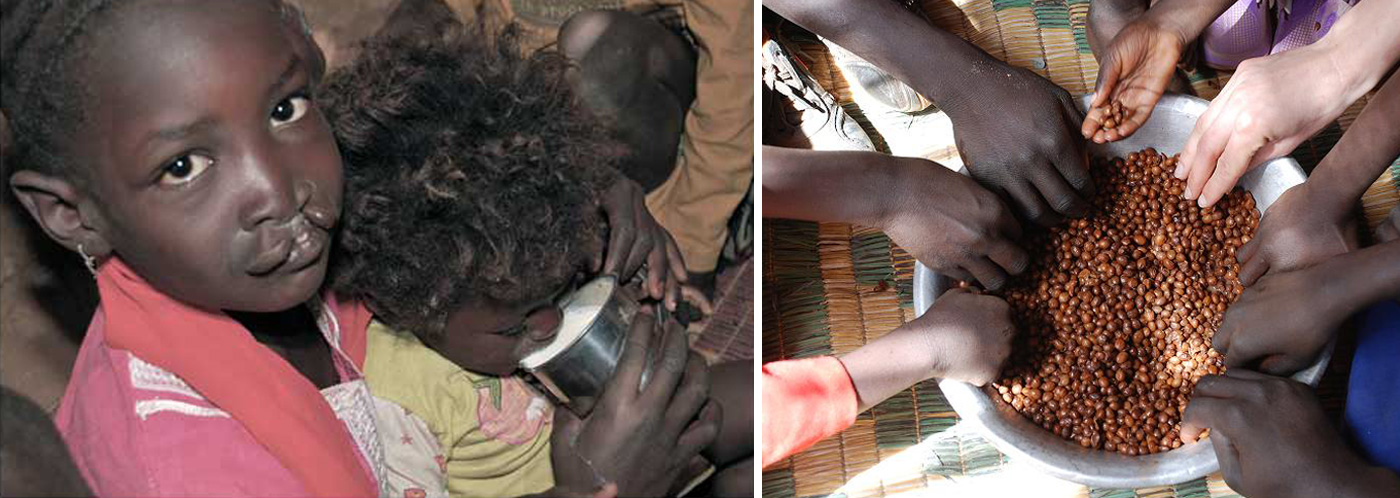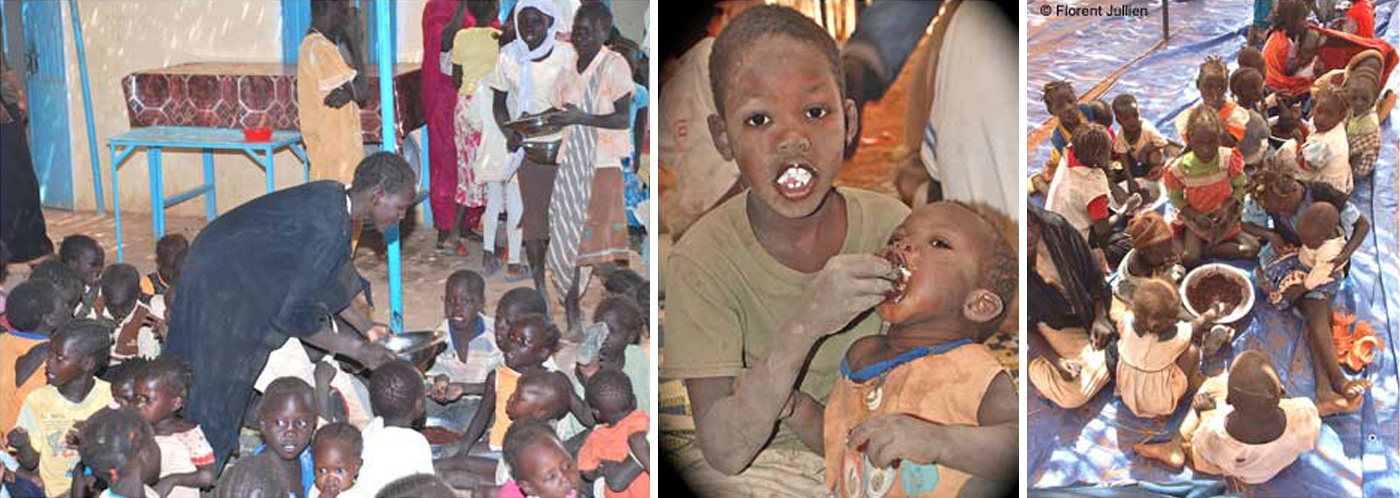Since 2015, ASASE no longer supports any program in Sudan.
This program was created in 2002 to ensure the survival of the small children living in IDP (internally displaced people) camps in the deserts surrounding Khartoum.
Camping in the middle of nowhere at one hour / one hour and a half from the city centre by car (taking chaotic trails), these derelict populations had many difficulties finding means of subsistence.
SVDP had bought land in the camps that were scattered around Khartoum, and had built and equipped 16 centres. Each centre distributed one meal, three days a week, to nearly 6 500 children under 7.
This action prevented problems related to malnutrition (psychic disorders, immunizing deficiencies, motor and intellectual troubles, deterioration of reproductive functions, blindness…).
Moreover, there sere much fewer children roaming the "streets" near our centers.
Finally, by providing a daily meal, 3 days per week, for the little children, this program made it possible to their parents to devote their energy to other needs.
One of the centres distributed food to the babies who live confined with their mother in prisons for women.
Despite the heavy logistics of the program, food represented half of its total cost, knowing that the price of certain staple food was some year submitted to a triple-digit inflation: lentils, sorghum, "balila" (millet beans), rice, onions…
The centres being very distant from one another, it was necessary to have a staff on site in each centre to prepare the meals. The staff consisted of 64 people, including 70% women.
The distribution on site was made by volunteer mothers whose children were registered in the program.
There was only one salaried person.
Testimonies
"I rarely cry. On more than one occasion I have been accused of, at best, having a heart of stone and, at worst, having no heart at all. I managed to remain objective at some of the smaller, quieter centres. When we visited one of the larger centres, however, my emotions took over. Confronted with the sight of 500 babies and children clamouring for food with arms outstretched I could not hold back the tears. As I watched a little girl, no more than six years old, refuse to eat until the baby in her arms had stopped reaching out for more food, I was completely and utterly overwhelmed.
The weekend before I went to Sudan I visited some friends who had recently had a baby.
As I sat among the children at the centre I tried to imagine how I would feel if it were their son sitting on the dirt floor. How would they feel having to watch their son crying out for food while flies settled around his eyes? I couldn't imagine it because I knew it would never happen. We would not tolerate such a situation in the UK. Yet the people who are being served by the centres have no choice but to tolerate it: having been forced out of their homes and away from their livelihoods the parents of these children are politically impotent. They do not choose to tolerate the situation: they are forced to. Sitting among the children at the centre the desperation and magnitude of the situation began to dawn on me.
At my desk in London, I had written about the Baby Feeding programme and my aim was to encourage individuals to donate money so that the project was financially viable.
At no point did I question the need for such a programme.
I would not wish this for my own child yet I had accepted without a second thought that this was a basic need in Sudan. If it is not good enough or acceptable for me, for us, why is it permissible for the people of Sudan? But until that question is answered there are empty stomachs to fill."
(Kate Bretherton, Saint-Vincent-de-Paul United Kingdom, February 2007)
"The morning fears were justified: it is difficult to hold back the tears in front of the sufferings of a small child, and it's also hard to bear those looks. But this contact gives us the strength to continue our mission, especially for us who are in affluence.
We enter the centre. It is a large courtyard surrounded by a wall, with three rooms: a storage facility with a reserve of food for one month, a small kitchen with a gas stove, and separate toilets for boys / girls. Outside: the water tank, and bowls for the hygiene of the children.
Despite the limited facilities and equipment, the centre is clean, many people (men and women) are present to assist, support, monitor and entertain children. A reeds roof protects from the sun and the heat. On the ground, a large straw mat welcomes the children.
We see them still happy, and very well behaved. They welcome us with great dignity. At breakfast, ¼ litre of milk will be served, and today for lunch, rice and lentils are on the menu. The children sing to welcome us.
The degree of solidarity between them surprises us: the elder ones help the small ones, and they are also often fed, as at home, there is nothing to eat."
(Deacon Robert Ferrua, Caritas Monaco, March 2010)





